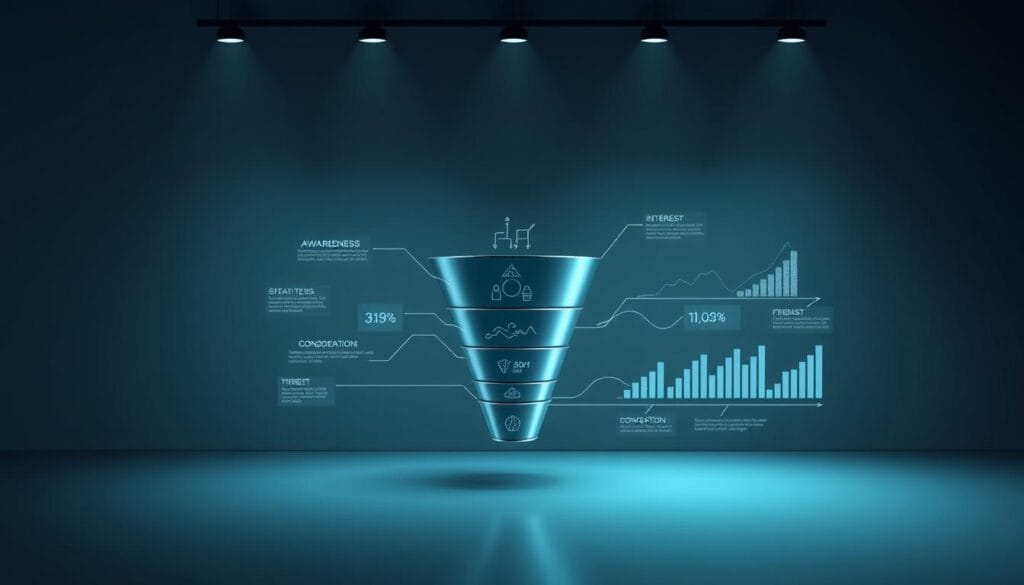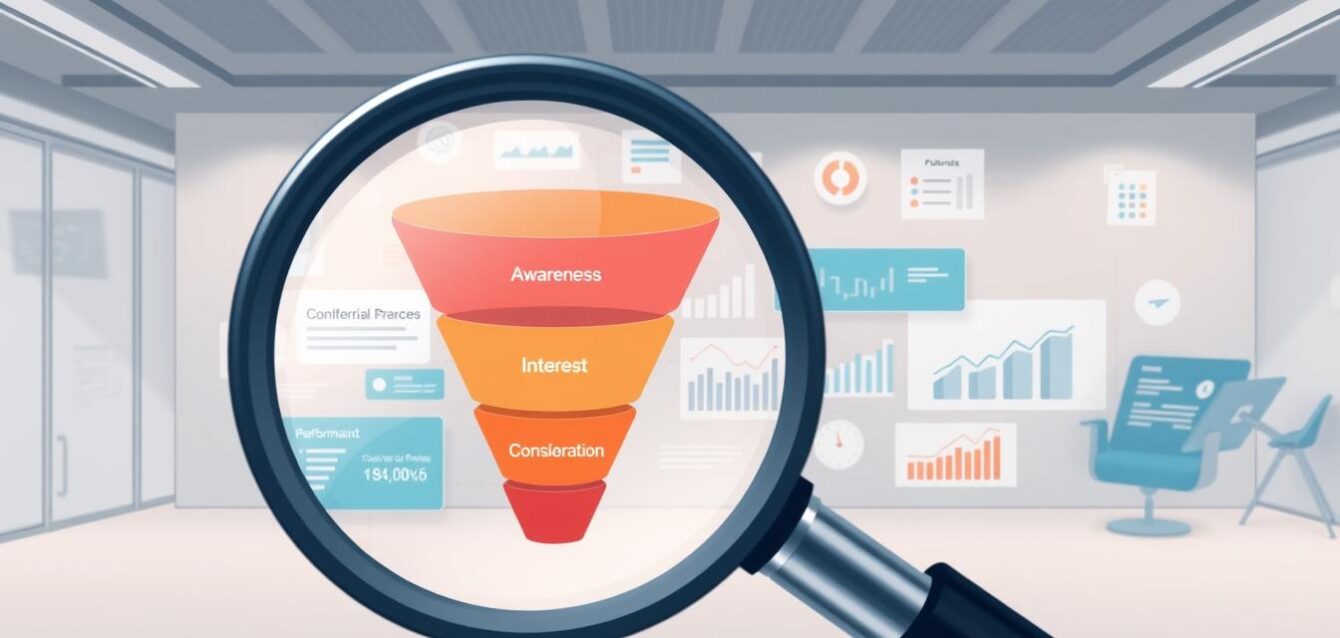Sixty-three percent of businesses have increased their marketing budgets recently — and that surge is squeezing high-ticket brands for every dollar of growth.
We see the result: rising acquisition costs, stalled returns, and invisible leaks that erode margin. We built a step-by-step playbook to expose those gaps and fix them fast.
Our approach sets a single source of truth across awareness, conversion, and loyalty. We quantify performance by stage so leadership can see where sales slow and where investment scales profitably.
We model objectives like OOFOS—prioritize revenue, align brand and media mix, then execute direct-to-checkout flows and urgency-driven offers to close gaps.
Expect clear, board-ready actions: projected lift, timelines, and owners that turn insight into measurable results. This is not opinion. It is evidence-driven strategy for durable growth.
Key Takeaways
- Rising budgets raise the cost of mistakes — a disciplined audit finds leaks fast.
- We create one source of truth and measure stages from awareness to loyalty.
- Revenue-first objectives align brand and media for better conversion efficiency.
- Direct checkout flows and time-bound bonuses reduce friction and close gaps.
- Board-ready recommendations include projected lift, owners, and timelines.
The high-stakes reality of funnel leaks in today’s crowded market
When 63% of businesses push more dollars into channels, the cost of mistakes becomes immediate and visible. Budgets rising across the board crowd inventory, lift bids, and shrink margins for premium brands that cannot afford wasted spend.
We require tight accountability: clear objectives, transparent attribution, and stage-level benchmarks that prove value. Without that rigor, higher spend simply accelerates losses.

Why increased budgets raise the bar for performance and accountability
Every dollar now needs a trail: who owns it, what metric it moves, and the expected return. Leadership dashboards must shift from vanity to value.
- Channel crowding inflates costs and makes sloppy funnels unaffordable for premium brands.
- We track aided vs. unaided awareness, CTR/CPC, conversion rate, CAC, ROAS, and ROI by stage.
- Demand smooths unevenly after urgency-driven promotions; we normalize forecasts to avoid surprises.
- Seasonality—like summer slowdowns—requires timing and offer adjustments to protect sales velocity.
- Qualitative signals (chat logs, call notes, poll replies) reveal why people hesitate and where sales leak.
- We make audits a quarterly operating ritual to lock accountability and defend budget.
Present-day pressures: rising CAC, stagnant ROAS, and missed revenue targets
Rising customer acquisition costs and flat returns force sharper choices in media allocation. We apply disciplined spend rules so each channel must earn its keep.
Executive alignment is non‑negotiable: we link funnel goals to company goals so teams move in one direction and every investment has a measurable owner.
What a Marketing Funnel Audit is and why it matters now
An objective, data-led review turns assumptions into measurable outcomes for leadership.

Objective, data-driven evaluation aligned to business goals and E-E-A-T
We define the review as a rigorous, end-to-end evaluation of effectiveness and relevance against strategic goals.
We align measurement to the customer journey so each stage has clear success criteria and accountable owners.
- We validate E-E-A-T with verifiable metrics and a transparent methodology that holds up in executive review.
- We document weaknesses, assign owners, and forecast lift so findings become board-grade plans.
- We fold in qualitative signals from customers and podcast community feedback to sharpen tests and hypotheses.
Mapping the review to the customer journey: Awareness, Consideration, Conversion, Loyalty
- Awareness: quantify aided vs. unaided recall and impressions to size the top of the funnel precisely.
- Consideration: test value propositions, differentiation, and social proof; track clicks, CTR, and CPC to measure fit.
- Conversion: analyze conversion rate, CAC, ROAS, and ROI; find friction in flows, product confidence, and pricing constructs.
- Loyalty: measure retention, referrals, expansion, and CLV; monitor onboarding completion and advocacy signals.
As an example, OOFOS set a revenue-first objective, mapped stage strategies, and used mixed-media to lift unaided awareness and sales. We turn that same process into repeatable strategy for premium brands.
Define clear objectives before you touch the data
Before we open spreadsheets, we set one decisive objective that shapes every test and spend decision. This prevents scattered effort and preserves senior focus. We pair a primary goal with two supportive targets so teams move with purpose.
Tie goals to the funnel: revenue growth, awareness lift, sales performance
We start with one primary objective—revenue—and two supporting goals: awareness lift and sales performance. Each maps to a funnel stage with a named owner and a timebound review cadence.
Set baselines and targets: aided vs. unaided awareness, CTR/CPC, conversion rate, ROAS, ROI
- Awareness: measure aided and unaided, set quarterly lift targets by reach and frequency.
- Consideration: fix CTR and CPC bands by channel and define pivot points.
- Conversion: commit to conversion rate, CAC, ROAS, and ROI bands tied to contribution margin.
Example blueprint inspired by OOFOS: aligning objectives to stage-specific strategies
Pick the bottleneck, fund it decisively, then sequence creative and channels. Constrain numbers to what leadership reviews weekly. Document decision rules so the team acts fast without second-guessing.
“We pick one primary objective and demand measurable progress each week.”
| Goal | Stage | Baseline | 90-Day Target |
|---|---|---|---|
| Revenue | Conversion | $1.2M / quarter | +15% revenue |
| Awareness | Top | Unaided 8% | Unaided 12% |
| Sales Performance | Consideration | CTR 1.2%, CPC $2.40 | CTR 1.6%, CPC ≤ $2.00 |
Diagnose performance by funnel stage to pinpoint leaks
Stage-level diagnostics reveal where attention and budget must move first. We break performance into four precise checks so every gap yields a clear owner and fix.
Top-of-funnel diagnostics: impressions, awareness, content reach
Measurable indicators: impressions, aided vs. unaided recall, reach by persona.
- Audit impression quality and reach against target audience segments.
- If aided outpaces unaided, strengthen brand cues, repetition, and memory structures.
- Action: deploy high-frequency creative and podcast placements to build recall.
Middle diagnostics: clarity, comparisons, engagement depth
Measurable indicators: clicks, CTR, CPC, time on content, scroll depth.
- Stress-test the product value proposition against direct competitors.
- Identify content that attracts but fails to convert into consideration.
- Action: add richer comparisons, case studies, and proof assets to close gaps.
Bottom diagnostics: conversion rate, checkout friction, offer clarity
Measurable indicators: conversion rate by device, CAC, ROAS, checkout drop-off.
- Dissect conversion by source and product; watch refund anxiety and unclear offers.
- Example: route warm traffic to a focused checkout with urgency and a bonus.
- Action: simplify steps, pre-address objections, and A/B test payment flows.
Post-conversion diagnostics: retention, advocacy, CLV signals
Measurable indicators: onboarding completion, expansion rate, referral counts.
- Scan support interactions and activation for early risk signals.
- Quantify customer health and route at-risk customers into success motions immediately.
- Action: prioritize a backlog with impact, effort, and a named owner to enforce momentum.
“Pinpointing stage weaknesses turns hypotheses into board‑grade initiatives.”
Identify opportunity gaps and prioritize high-impact fixes
Start by mapping which gaps buy back margin fastest—then act with surgical capital.
We turn diagnosis into a prioritization plan that is stage-aware and ROI-driven. Rank fixes by revenue impact versus effort, fund the top quartile first, and time-box experiments.
When to push mixed-media awareness and brand recall
If aided awareness dwarfs unaided, push mixed-media now. Video, podcasts, and athlete stories build memory and cut future CAC.
Messaging and offer-market fit: overcoming price, time, and fit objections
Pressure-test messaging against three objections—price, time, fit. Craft clear offer options that neutralize each objection.
- Price: present tiered offers and value proof.
- Time: use limited-time bonuses to reduce delay.
- Fit: show specific outcomes and customer stories.
Seasonality and audience readiness: interpreting dips and timing launches
Avoid high-consideration launches during seasonal lulls unless the offer is irresistible. Sequence launches around readiness and create fast-follow offers to stabilize post-launch revenue.
“Headline the transformation, then the mechanism, then the proof—simplicity converts faster.”
Implement stage-by-stage improvements that convert
Each stage needs a precise playbook that turns attention into buyers. We lay out simple, tactical steps that scale across campaigns and protect margin.
TOFU: build unaided awareness
Deploy SEO content that answers executive-intent queries. Amplify via social media and anchor memory with distinctive video cues.
MOFU: earn consideration
Publish case studies with hard numbers, run webinars that handle objections live, and ship unbiased product comparisons to convert leads into qualified prospects.
BOFU: simplify the path to purchase
Route hot traffic to a focused page with a concise explainer video, a countdown timer, and a time-bound offer. Add a clear guarantee and a short sales message to speed the decision.
Post-purchase: grow CLV
Onboarding and success programs reduce churn. Layer referral incentives and scheduled checkpoints to turn buyers into advocates.
Live‑launch tactics that close
Duplicate checkout pages—standard vs event-specific—cut confusion and raise velocity. Use a P.S. follow-up within 24 hours to re-activate buyers on the fence. Pre-build nurture to warm leads and synchronize creative across channels.
| Stage | Key Tactic | Example Offer | Expected Impact |
|---|---|---|---|
| TOFU | SEO content + social media + video | Thought leadership series | Increase unaided awareness |
| MOFU | Case studies, webinars, comparisons | Free webinar + comparison guide | Improve lead quality |
| BOFU | Direct-to-checkout page, countdown | Workshop Special + bonus call | Raise conversion rate |
| Post-purchase | Onboarding + referral engine | Onboarding + referral credit | Lift CLV and referrals |
“Tactical clarity at each stage eliminates friction and converts faster.”
Instrument measurement, run content audits, and iterate on results
Measurement must start with stage-level KPIs that map directly to revenue impact. We set clear metrics, instrument them, and tie every page and program to contribution margin.
KPIs that matter
- Awareness: impressions, aided vs. unaided recall, reach by persona.
- Consideration: clicks, CTR, CPC per channel and page.
- Conversion: conversion rate, CAC, ROAS, ROI by source.
- Loyalty: retention, expansion, onboarding completion.
Content audit workflow
Run a quarterly inventory: map every blog, post, and page to the journey. Tag assets as high, medium, or low performance by time on page, bounce, and conversion impact.
- Fix underperformers: improve headlines, proofs, CTAs, and load times.
- Repurpose winners: transform a high-performing blog into webinars, posts, and sales collateral.
- Add testing cadence: A/B headlines, offers, and page sections with clear sample-size rules and decision gates.
“Tie results to payback and contribution margin so content and channel investments scale rationally.”
Document workflows and build a unified dashboard with drill-down by channel, audience, and page. Feed podcast insights and buyer Q&A into planning so content mirrors real buyer language and drives measurable results.
Conclusion
Acting quickly on stage-level signals separates brands that grow from brands that stall. Move the highest-return fixes—direct-to-checkout flows, sharpened offers, and live-launch tactics—into action this week.
We proved the approach with objective-led, mixed-media work and athlete-driven proof that raised awareness and cut CAC. Run a rapid content check, clean up the bottom of the funnel, and deploy the P.S. follow-ups that close hesitant buyers.
We will help get you from diagnosis to deployment in days, not months. Unlock Macro Webber’s Growth Blueprint and book a consultation—limited executive slots this quarter—to model revenue upside and build your next 90-day plan.
